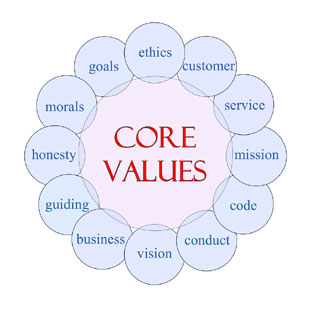Core Values Lead to Competitive Success
 There must be something in the water. The CEOs of two organizations, one a financial institution and one a marketing company conveyed to me that they do not believe in having mission and core value statements. Neither company is doing well. The financial institution has a fractured executive team due to a recent merger and the marketing company has been bleeding revenues heavily for the past two years. Coincidence? Maybe, maybe not. Mission and vision statements are valuable. Core values are priceless.
There must be something in the water. The CEOs of two organizations, one a financial institution and one a marketing company conveyed to me that they do not believe in having mission and core value statements. Neither company is doing well. The financial institution has a fractured executive team due to a recent merger and the marketing company has been bleeding revenues heavily for the past two years. Coincidence? Maybe, maybe not. Mission and vision statements are valuable. Core values are priceless.
Core values are a company’s essential and enduring tenets – a set of general guiding principles, not to be confused with specific cultural or operating practices. It’s what people believe, deep down in their fundamental belief system.
Typically, a business leader starts the company, finds customers, hires people and before long, a real company is born. In the beginning stages of growth, there aren’t a lot of people and the energy and presence of the leader is enough to fuel the company’s growth. The leader acts a certain way with customers and sometimes talks about how important integrity, for example, is when hiring new people.
As the company grows beyond the leader’s span of control, not everyone is able to feed off the CEO’s energy any longer, nor can the CEO have direct contact with each employee. By the time a company grows to 20 or more employees, if solid values are not set in place, behavior issues will so inundate the organization that the CEO will wish for a much smaller organization. Here’s how to establish your company’s core values.
Core values must come from the CEO. Of course, the management team can be part of the discussion. However, the building of the foundation for the values that the company lives by must rest on the shoulders of the CEO. Here are three steps to creating a values-centered company culture.
- Align the vision, strategies and operating practices of the company with its unique culture and core values.
- Design and manage key processes to ensure that the people who are hired, retained, promoted and highly compensated are those who embrace the company’s culture and values.
- Provide evidence that will promote belief in the central importance of company values. This evidence is made up of values-consistent practices and goals as well as company lore, posters, prizes, awards and other tangible reminders.
Of course, just creating a list of values and posting them on the lunchroom wall isn’t effective. Once those values are created, a company has to walk the talk.
Core values bring a bounty of benefits including:
- Better decisions
- Better behaviors
- Better performance
- Improved culture
Develop a culture based on your company’s core values and define the behaviors you want people to embrace based on those values. A company’s values – what it stands for, what its people believe in – are crucial to its competitive success. It’s the ideas of a business that encourage employees to care, not some manager with authority. The values must support the mission and vision of the organization. Have you written yours yet?
Questions? Comments? Call 404-320-7834 or email This email address is being protected from spambots. You need JavaScript enabled to view it. or visit www.performstrat.com
Graphic Credit: Big Stock